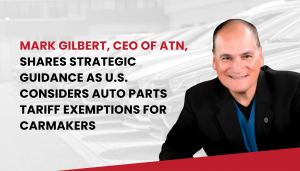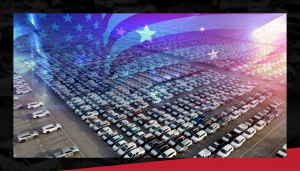Mark Gilbert, CEO of ATN, Shares Strategic Guidance as U.S. Considers Auto Parts Tariff Exemptions for Carmakers
“These tariff discussions highlight how interconnected and vulnerable the automotive supply chain really is,” says Gilbert. “But it also presents an opportunity for dealerships to adapt, realign their strategies, and show resilience in the face of market shifts.”
The proposed tariffs, aimed at strengthening domestic production, could significantly increase costs for automakers that rely on imported parts. While exemptions may lessen the burden for U.S. manufacturers, the impact on dealership operations remains complex. Supply chain delays, fluctuating inventory, and rising vehicle prices are all in play.
Gilbert stresses that dealerships must focus on three core areas: inventory agility, proactive customer communication, and team training.
“Dealerships that can quickly shift inventory strategies—focusing on domestically produced models or diversifying suppliers—will be in a better position to manage disruption,” Gilbert notes. He also recommends stocking up on used and certified pre-owned vehicles, which may see increased demand if new car prices spike due to tariffs.
Equally important is clear, consistent communication with customers. “We know today’s buyers are tuned to the news. When they hear about tariffs, they worry about higher prices or fewer choices. Dealerships need to address those concerns head-on,” says Gilbert. That means educating sales teams to explain potential price changes, offering flexible financing options, and providing transparent guidance to build trust.
Gilbert also emphasizes that training is a dealership’s best investment during uncertain times. “Your people are your front line. Equipping them with the knowledge and tools to navigate these conversations confidently will make a huge difference in customer satisfaction and retention.”
ATN is actively working with dealer partners nationwide to update training modules in response to the evolving policies. Programs now include guidance on customer reassurance, sales agility in pricing-sensitive environments, and adapting to fluctuating inventory.
“If the exemptions go through, we may avoid some of the most severe cost hikes—but the environment will still be competitive,” says Gilbert. “Dealerships that move now, prepare their teams, and stay transparent with their customers will have the edge.”
Mark Gilbert
ATN
+1 480-999-5055
email us here
Legal Disclaimer:
EIN Presswire provides this news content "as is" without warranty of any kind. We do not accept any responsibility or liability for the accuracy, content, images, videos, licenses, completeness, legality, or reliability of the information contained in this article. If you have any complaints or copyright issues related to this article, kindly contact the author above.
Resource Design & Build, LLC Completes Renovation at 6477 Old Shadburn Ferry Road
Naples Soccer Academy Welcomes Peter Giannopoulos as Director of Security
Dino Days A Dinosaur Themed Train Ride Sept. 13th & 14th Phillipsburg, NJ
Więcej ważnych informacji
 Jedynka Newserii
Jedynka Newserii

 Jedynka Newserii
Jedynka Newserii

Konsument

Polacy nie korzystają z hossy trwającej na warszawskiej giełdzie. Na wzrostach zarabiają głównie inwestorzy zagraniczni
Od października 2022 roku na rynkach akcji trwa hossa, nie omija ona także warszawskiej giełdy. Mimo to inwestorzy indywidualni odpowiadają zaledwie za kilkanaście procent inwestycji, a o wzrostach decyduje i na nich zarabia głównie kapitał z zagranicy. Widać to również po napływach i odpływach do i z funduszy inwestycyjnych. Zdaniem Tomasza Koraba, prezesa EQUES Investment TFI, do przekonania Polaków do inwestowania na rodzimej giełdzie potrzeba zysków z akcji, informacji o tych zyskach docierającej do konsumentów oraz czasu.
Polityka
Obowiązek zapełniania magazynów gazu w UE przed sezonem zimowym ma zapewnić bezpieczeństwo dostaw. Wpłynie też na stabilizację cen

Unia Europejska przedłuży przepisy z 2022 roku dotyczące magazynowania gazu. Będą one obowiązywać do końca 2027 roku. Zobowiązują one państwa członkowskie do osiągnięcia określonego poziomu zapełnienia magazynów gazu przed sezonem zimowym. Magazyny gazu pokrywają 30 proc. zapotrzebowania Unii Europejskiej na niego w miesiącach zimowych. Nowe unijne przepisy mają zapewnić stabilne i przystępne cenowo dostawy.
Infrastruktura
Gminy zwlekają z uchwaleniem planów ogólnych zagospodarowania przestrzennego. Może to spowodować przesunięcie terminu ich wejścia w życie

Reforma systemu planowania i zagospodarowania przestrzennego rozpoczęła się we wrześniu 2023 roku wraz z wejściem w życie większości przepisów nowelizacji ustawy z 27 marca 2003 roku. Uwzględniono w niej plany ogólne gminy (POG) – nowe dokumenty planistyczne, za których przygotowanie mają odpowiadać samorządy. Rada Ministrów w kwietniu br. uchwaliła jednak ustawę o zmianie ustawy z 7 lipca 2023 roku, a jej celem jest zmiana terminu obowiązywania studiów uwarunkowań i kierunków zagospodarowania przestrzennego gmin na 30 czerwca 2026 roku. Wskazana data może nie być ostateczna z uwagi na to, że żadna z gmin nie uchwaliła jeszcze POG.
Partner serwisu
Szkolenia

Akademia Newserii
Akademia Newserii to projekt, w ramach którego najlepsi polscy dziennikarze biznesowi, giełdowi oraz lifestylowi, a także szkoleniowcy z wieloletnim doświadczeniem dzielą się swoją wiedzą nt. pracy z mediami.










.gif)

 |
| |
| |
|